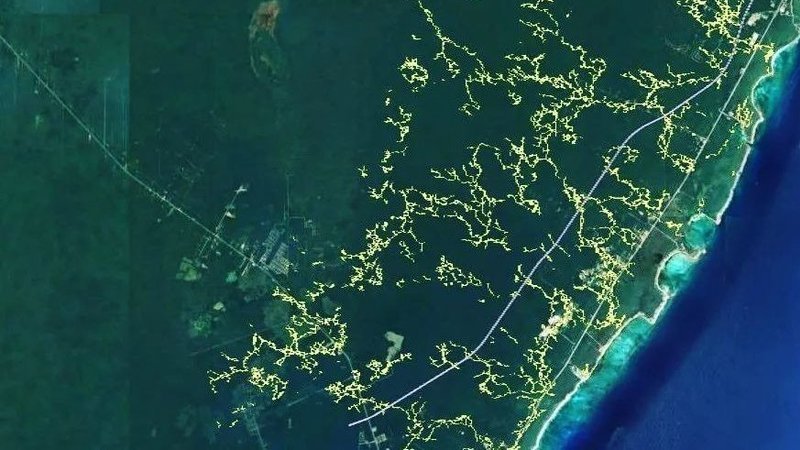| ||||||||||||||||
| ||||||||||||||||
¿Qué pensarías tú si las fuentes de captación de agua dulce más importantes del sur de México dejaran de existir? Tristemente este futuro puede ser una realidad si no lo impedimos lo antes posible. Esta petición nace con el objetivo de llegar al presidente de la República Mexicana para que detenga por completo los planes de construcción del Tren Maya sobre las cuevas y cenotes de Quintana Roo. La construcción precipitada de este proyecto atenta a la salud de los ecosistemas y su biodiversidad, a la conservación de la fauna, de los mantos acuíferos que son fundamentales para el atractivo turístico y para la naturaleza. Desde diciembre de 2018, se anunció el plan de desarrollo llamado “Tren Maya”, el cual plantea la construcción de infraestructura vial y ferroviaria como motor del desarrollo inmobiliario, comercial y turístico de la Península de Yucatán. El proyecto comprende, entre otros, 1,460 kilómetros de ferrocarril de velocidad media, varias estaciones, infraestructura vial y nuevos centros de población y polos de desarrollo. El ferrocarril atravesará por la selva maya -segundo pulmón forestal de América Latina después de la Amazonia-, fragmentándola y causando impactos irreversibles a la vegetación, al suelo, al agua, a la biodiversidad y acelerando la urbanización. El proyecto del Tren Maya implica numerosos riesgos e impactos ambientales a todo el sureste mexicano, zona de alta riqueza biológica e importancia para la conservación y protección de la selva maya, del acuífero y de la biodiversidad. Aunque la falta de certeza sobre el trazo final del proyecto impide identificar los impactos puntuales que se pudieran ocasionar al hábitat y a los ecosistemas terrestres y costeros, es posible identificar que el Tren Maya causarán diversos daños e impactos ambientales como son: 1.- Deforestación: el impacto del proyecto del nuevo tramo 5 sobre la cobertura forestal existente en la Península de Yucatán es grande y particularmente en el Estado de Quintana Roo. 2.- No se están considerando las cavernas, Lagunas, aguadas, mangrares y cenotes por las cuales pasará el Tren Maya en su nuevo trazo. En particular los más de mil kilometros explorados entre Playa del Carmen y Tulum. 3.- Extinción de flora y fauna: se impactará el área donde se albergan múltiples especies, como el cedro, ciricote, mangle, especies de palmas; jaguar, ocelote, tapir, mono aullador, mono araña, especies de tortuga, tlacuache, cacomixtle, mapache, puma, cocodrilo, especies de serpientes, especies de murciélagos, especies de iguanas, guacamaya, flamenco, quetzal, tucán, gran variedad de aves residentes y migratorias, entre muchas otras, agunas de ellas en peligro de extinción y protegidos por normas y tratados. 4.- Sobreurbanización: El proyecto abrirá las puertas a generar una sobreurbanización no preparada ni planeada así como la explotación de bancos de material que devastarán la zona forestal. Mucha de esta tierra impactada pertenece a ejidos y comunidades indígenas. Más información: https://www.cemda.org.mx/postura-del-centro-mexicano-de-derecho-ambiental-respecto-al-proyecto-tren-maya/ What would you think if the most important freshwater aquifer in southern Mexico ceased to exist? Sadly, this future may become a reality if we don’t prevent it as soon as possible. This petition was created with the objective of reaching the president of the Mexican Republic Andres Manuel Lopez Obredor to completely stop the construction of the Tren Maya megaproject on the caves and cenotes in the Riviera Maya between Cancun and Tulum. 1.- Deforestation: the impact of the project on the existing forest cover in the Yucatan Peninsula is great. 2.- Avoid the destruction of regions aquifer. The caverns and cenotes through which the Tren Maya will pass are not being considered. The train, as planned now, will pass directly over the Sacactun Cave System, the second longest cave in the world, all of it underwater. Within Sacactun are some of the oldest human remains yet found in the Western Hemisphere, not to mention valuable artifacts from the Ancient Maya Civilization. 3.- Extinction of flora and fauna: The project will affect the area where various species are found, such as cedar, ciricote, mangrove species, palm species; jaguar, ocelot, tapir, howler monkey, spider monkey, turtle species, opossum, cacomixtle, raccoon, puma, crocodile, snake species, bat species, iguana species, macaw, flamingo, quetzal, toucan, wide variety of birds residents and migrants, among many others. 4.- Over-urbanization: The project will open the doors to generate an unprepared or unplanned over-urbanization. Much of the land is owned by indigenous Maya communities who are being forced to negotiate the sale of their land or risk having it expropriated. Please sign this petition so we can wake the Mexican Government up to the tremendous risks this project poses to the natural and cultural heritage of this area. |

No hay comentarios:
Publicar un comentario